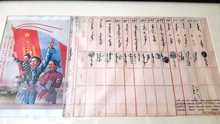| ||||||||||||||||||||||
| Referendum on the independence of the Mongolian People's Republic from China | ||||||||||||||||||||||
| Results | ||||||||||||||||||||||
|---|---|---|---|---|---|---|---|---|---|---|---|---|---|---|---|---|---|---|---|---|---|---|
| ||||||||||||||||||||||

| Politics of Mongolia |
|---|
 |
| Constitution |
| Parliament |
| Executive |
| Judiciary |
Elections
|
| Administrative divisions |
|
Foreign relations
|
|
|
An independence referendum was held in the Mongolian People's Republic on 20 October 1945. It was approved by 100% of voters, with no votes against, according to official statistics. Voter turnout was 98%.
Mongolia had gained de facto independence from the Republic of China in the Mongolian Revolution of 1921. In that year the last Chinese troops in Mongolia had been expelled by the White Russian general Roman von Ungern-Sternberg, prompting Soviet intervention. The Mongolian People's Republic was effectively an unrecognized satellite state of the Soviet Union (USSR). Towards the end of World War II, the USSR pushed China for formal recognition of the status quo, threatening to stir up Mongolian nationalism within China. In the Sino-Soviet Treaty of Friendship and Alliance signed on 14 August 1945, China agreed to recognize Mongolian independence after a successful referendum.
Results
| Choice | Votes | % | |
|---|---|---|---|
| For | 487,409 | 100.00 | |
| Against | 0 | 0.00 | |
| Total | 487,409 | 100.00 | |
| Valid votes | 487,409 | 100.00 | |
| Invalid/blank votes | 0 | 0.00 | |
| Total votes | 487,409 | 100.00 | |
| Registered voters/turnout | 494,960 | 98.47 | |
| Source: Nohlen et al. | |||
Reactions
In January 1946, the Nationalist Government of the Republic of China officially recognized the "independence of Outer Mongolia" based on referendum results.
Analysis
At the scientific conference dedicated to the 70th anniversary of the referendum, Zandaakhüügiin Enkhbold, speaker of the State Great Khural, said that the referendum in 1945 was the first democratic vote in Mongolia, and was of great historical significance to the independence of the country.
Sergey Radchenko, a professor of East China Normal University noted that the "referendum was regarded by both sides as political theatre, due to the peculiarity of a supposed unanimous 100% vote in favour."
See also
References
- Dieter Nohlen, Florian Grotz & Christof Hartmann (2001) Elections in Asia: A data handbook, Volume II, p490. ISBN 0-19-924959-8.
- Nohlen et al., p491.
- Eric, A. Hyer (2005). "HAUNTED BY HISTORY: CHINA AND ITS NORTHWESTERN NEIGHBOURS" (PDF). Historia Actual Online. 7: 87. ISSN 1696-2060.
- "Scientific conference runs on 70th anniversary of Public Referendum". MONTSAME News Agency. Retrieved 2023-07-18.
- Sergey Radchenko (22 October 2015), "The Truth About Mongolia's Independence 70 Years Ago", The Diplomat. Retrieved 3 December 2019.
| Presidential elections | |
|---|---|
| Parliamentary elections | |
| Referendums | |